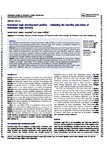Emotional logic development profiles – validating the benefits and safety of emotional logic training
| dc.contributor.author | Zahra, Daniel | |
| dc.contributor.author | Langsford, M | |
| dc.contributor.author | Griffiths, T | |
| dc.date.accessioned | 2016-07-01T13:51:19Z | |
| dc.date.available | 2016-07-01T13:51:19Z | |
| dc.date.issued | 2016-07-02 | |
| dc.identifier.issn | 1365-1501 | |
| dc.identifier.issn | 1471-1788 | |
| dc.identifier.uri | http://hdl.handle.net/10026.1/5012 | |
| dc.description | peerreview_statement: The publishing and review policy for this title is described in its Aims & Scope. aims_and_scope_url: http://www.tandfonline.com/action/journalInformation?show=aimsScope&journalCode=ijpc20 | |
| dc.description.abstract |
OBJECTIVE: Validation of the Emotional Logic Development Profile (ELDP) as a measure of improvements in emotional literacy and well-being resulting from emotional logic (EL) training; a programme designed to improve emotional literacy and reduce depression and anxiety. METHOD: A general adult population sample was recruited to obtain normative ELDP data, from which clinically significant change, reliability and psychometric properties could be assessed against a patient sample. This consisted of 53 patients at a UK primary care medical practice who were offered EL while on a waiting list for other psychological therapies. Patients completed the PHQ-9, GAD-7 and ELDP at initial and two-month follow-up sessions. ELDP factor structure and sensitivity were assessed, and semistructured follow-up interviews provided additional qualitative data on acceptability. RESULTS: PHQ-9, GAD-7 and ELDP all showed significant improvements between pre- and post-EL measurement. The ELDP appears unidimensional, provides additional information to the PHQ-9 and GAD-7 and is sensitive to change. Furthermore, 17% of patients showed reliable, clinically significant improvements in ELDP scores. General practice (GP) consultations and medication use both significantly reduced. CONCLUSIONS: The ELDP reliably measures ELs impact on reducing depression and anxiety. Further evaluation of EL viability for wider use in primary care, and in other age groups, may prove beneficial. | |
| dc.format.extent | 141-145 | |
| dc.format.medium | Print-Electronic | |
| dc.language | en | |
| dc.language.iso | en | |
| dc.publisher | Informa UK Limited | |
| dc.subject | Emotional logic | |
| dc.subject | ELDP | |
| dc.subject | GAD-7 | |
| dc.subject | PHQ-9 | |
| dc.subject | Psychometrics | |
| dc.title | Emotional logic development profiles – validating the benefits and safety of emotional logic training | |
| dc.type | journal-article | |
| dc.type | Journal Article | |
| plymouth.author-url | https://www.webofscience.com/api/gateway?GWVersion=2&SrcApp=PARTNER_APP&SrcAuth=LinksAMR&KeyUT=WOS:000380144000004&DestLinkType=FullRecord&DestApp=ALL_WOS&UsrCustomerID=11bb513d99f797142bcfeffcc58ea008 | |
| plymouth.issue | 3 | |
| plymouth.volume | 20 | |
| plymouth.publication-status | Published | |
| plymouth.journal | International Journal of Psychiatry in Clinical Practice | |
| dc.identifier.doi | 10.1080/13651501.2016.1197270 | |
| plymouth.organisational-group | /Plymouth | |
| plymouth.organisational-group | /Plymouth/Faculty of Health | |
| plymouth.organisational-group | /Plymouth/Faculty of Health/Peninsula Medical School | |
| plymouth.organisational-group | /Plymouth/Research Groups | |
| plymouth.organisational-group | /Plymouth/Research Groups/Plymouth Institute of Health and Care Research (PIHR) | |
| plymouth.organisational-group | /Plymouth/Users by role | |
| plymouth.organisational-group | /Plymouth/Users by role/Academics | |
| dc.publisher.place | England | |
| dcterms.dateAccepted | 2016-04-25 | |
| dc.rights.embargodate | 2017-6-16 | |
| dc.identifier.eissn | 1471-1788 | |
| dc.rights.embargoperiod | No embargo | |
| rioxxterms.versionofrecord | 10.1080/13651501.2016.1197270 | |
| rioxxterms.licenseref.uri | http://www.rioxx.net/licenses/all-rights-reserved | |
| rioxxterms.licenseref.startdate | 2016-07-02 | |
| rioxxterms.type | Journal Article/Review |


